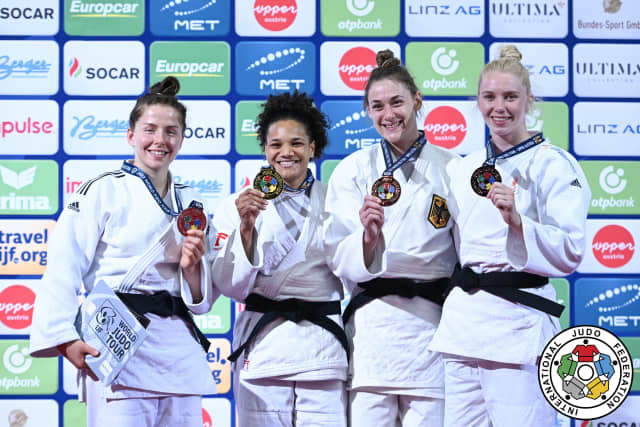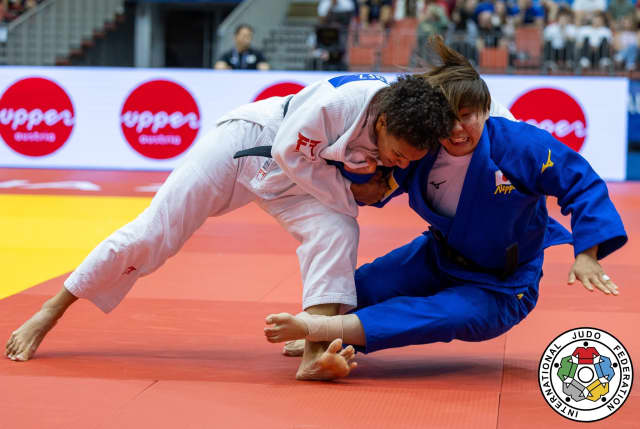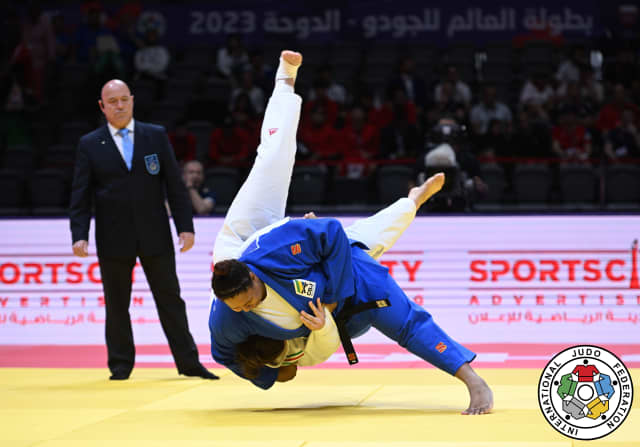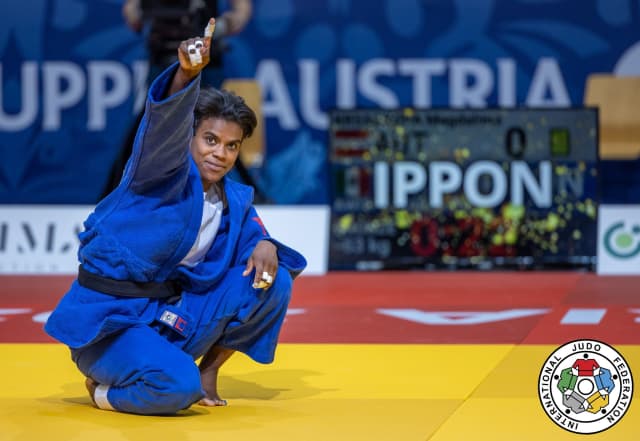Looking below the Japanese flag, among those gold medal winning countries, is an unexpected set of colours. Maria Perez of Puerto Rico put her country squarely in the mix, winning the -70kg category. Not unknown on the World Judo Tour, the 34 year old was on the world championship podium in 2017 but in all her years at the elite level and with many good medals in her pocket, she still had no golds to her name, until competing in Linz.
Perez’s draw was not kind, putting her against a familiar Pan-American face first, Castilhos of Brazil. She passed that by holding on to a waza-ari until the bell sounded, employing her intelligence, perhaps her most valuable commodity, throughout.
In round two she was sure to lose against the young energy of 20 year old Japanese judoka Kuwagata, but no, she didn’t, again staying clever, scoring at around the one minute mark and following up with a gripping masterclass to hold her lead. That put her into a quarter-final against number one seed and world silver medallist from just two weeks ago, Scoccimarro (GER).
At this point we have to splash a little cold water on our faces and remind ourselves that the flag, the expectation of certain performances from certain countries, is never ever a guarantee in judo and actually this quarter-final was held between two world silver medallists, two experienced athletes, both aiming at the same thing.
The result? Perez threw the German twice inside the first minute and marched into the semi-final to face number 4 seed Hilde Jager (NED). She threw the Dutch opposition for ippon, also in the first minute and set up a final against number 2 seed Kelly Petersen Pollard of Great Britain, far less experienced than the Puerto Rican but not unknown with 3 grand slam medals and a continental gold from her junior days.
Perez won the final with the same intelligence she showed in the early rounds, gripping like a boss and securing the waza-ari, which she had threatened throughout. The whole day was shaped by confidence, power and intelligence and she really was the stand-out judoka of the category.
🇵🇷🇵🇷🇵🇷 History making!! First ever World Tour Gold for Puerto Rico and Maria Perez! Absolutely PURfect!
— Judo (@Judo) May 26, 2023
📺 Watch live on https://t.co/AVIXV0hBw7 premium now!#JudoUpperAustria #Judo #UpperAustria #Austria #Sport #OlympicQualifiers #RoadToParis2024 #WJT #Olympics #Linz pic.twitter.com/nUdIAxt0KD
From Pan-America we often find Brazilians on podia, such as Rafael Silva and Beatriz Souza, both bronze medallists in Doha, not present in Upper Austria. Andy Granda (CUB) became world champion in Tashkent in 2022. Pareto (ARG) became Olympic champion in Rio in 2016. There are plenty of impressive individual results but what we don’t often see is a continental consistency with a variety of countries all pushing the envelop at the same event. In Linz however, there has been a quiet surge.
Prisca Awiti Alcaraz (MEX) came close in Doha, placing 5th but she converted that in Austria to win her first ever WJT medal contest to take bronze. There was also young Jack Yonezuka (USA) who narrowly missed out on a place in the final block, placing 7th, a career-best on the Tour for the 20 year old.
Three Pan-American countries with top 8 placings, one of them with a gold medal, is really something and points to an Olympic cycle ahead, beyond Paris, which might just yield an untraditional set of podia. Los Angeles 2028 is looming and as we know, these years pass at quite a rate; we will be there soon enough. A Pan-American Games is being prepared for on American home soil and in the neighbouring nations, that’s no longer in doubt.




